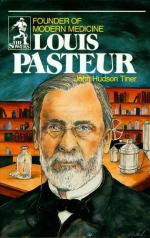|
This section contains 1,133 words (approx. 4 pages at 300 words per page) |

|
World of Genetics on Louis Pasteur
Louis Pasteur left a legacy of scientific contributions that include an understanding of how microorganisms carry on the biochemical process of fermentation, the establishment of the causal relationship between microorganisms and disease, and the concept of destroying microorganisms to halt the transmission of communicable disease. These achievements led him to be called the founder of microbiology.
After his early education, Pasteur went to Paris to study at the Sorbonne, then began teaching chemistry while still a student. After being appointed chemistry professor at a new university in Lille, France, Pasteur began work on yeast cells and showed how they produce alcohol and carbon dioxide from sugar during the process of fermentation. Fermentation is a form of cellular respiration carried on by yeast cells, a way of getting energy for cells when there is no oxygen present. Pasteur found that fermentation would take place only when living yeast cells...
|
This section contains 1,133 words (approx. 4 pages at 300 words per page) |

|


